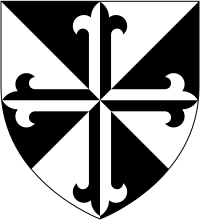Holy Name Society

Dominican Order Coat of Arms
|
|
| Formation | early 15th century |
|---|---|
| Type | Catholic religious order |
|
Key people
|
Didacus of Victoria |
| Website | [1] |
The Society of the Holy Name, formally known as the Confraternity of the Most Holy Name of God and Jesus, is a Roman Catholic confraternity of the laity and is one of several which are under the care of the Dominican Order. It is open to all Catholic adults. The primary object of the society is to beget reverence for the Holy Name of God and Jesus Christ; it is also dedicated to making reparations, in particular, for blasphemy, perjury and immorality.
The Council of Lyons in 1274 emphasized the need for the faithful to have a special devotion to the Holy Name of Jesus. The Dominicans, who were actively spreading the Christian message at this time in a crusade against the Albegensians took on the challenge and preached the power of the Holy Name of Jesus. They spread the devotion extremely effectively. In every Dominican church, altars, confraternities and societies were erected everywhere in honour of the Holy Name.
The devotion grew rapidly with the preaching of the Dominican order and several saints (including Bernardino of Siena, a Franciscan, and John of Capistrano). The devotion and confraternities were given further impetus by several grants of indulgence by Pope Boniface IX and Pope Julius II.
The first Holy Name Society in the modern sense was founded in the early 15th century by Didacus of Victoria, one of the greatest preachers of the devotion to the Divine Name. He founded the "Society of the Holy Name of God," and created a rule for its governance whose purpose "was to suppress the horrible profanation of the Divine Name by blasphemers, perjurers, and by men in their ordinary conversation." Long after Didacus' death in 1450, Pope Pius IV approved the society on April 13, 1564. In later years, the Society of the Holy Name of God merged with the "Confraternity of the Most Holy Name Jesus" maintaining the rule laid down by Didacus. The society was thereafter also known under the title of the "Confraternity Against Oaths." Several Popes following Pius IV in the 16th and 17th centuries also made the Confraternity an object of special preference, including, most notably Pope Innocent IX who strongly encouraged its promotion and issued orders regulating its organisation.
...
Wikipedia
